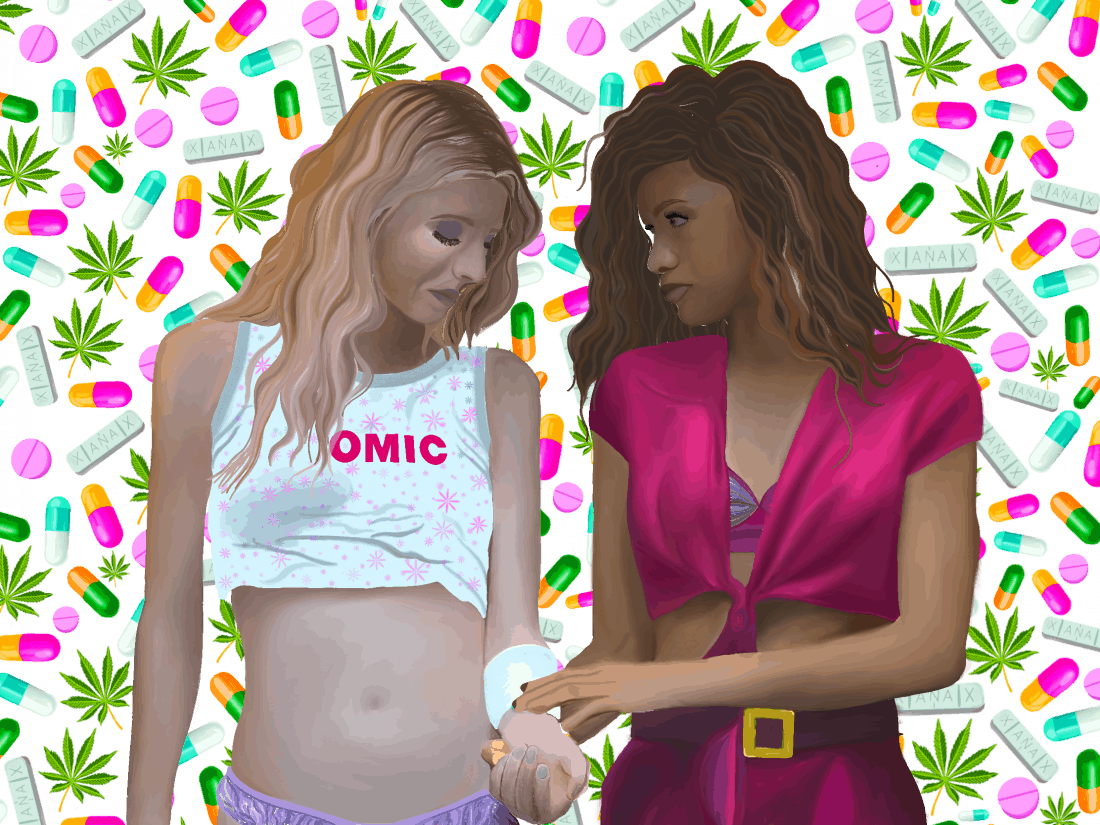
HBO’s Euphoria is an adaption of the Israeli show of the same name. The explicit high school drama follows 17-year-old Rue Bennett, a girl fresh out of rehab with no intention of staying clean.
Rue is played by former Disney star Zendaya Coleman who delivers an Emmy-worthy performance in this role. Her co-star, model and trans activist Hunter Schafer plays Jules Vaughn who is new to the California suburbs. The two become fast friends, and Rue finally decides to get clean because of Jules.
While it doesn’t portray the most realistic high school experience, Euphoria successfully tackles issues teenagers are dealing with today. Addiction, sexuality, pornography, mental illness, teen pregnancy and sexual assault are a few of the topics addressed in the first season.
Rue’s drug addiction began at age 13 when she tried some of her father’s painkillers to help her cope with her cocktail of mental illnesses. This is a timely show as the average user of illicit drugs starts at age 15.
Though efforts are being made to reduce the stigma and create safe spaces for drug users — as seen with the creation of safe consumption sites, even one here in Saskatoon — there is still a long way to go.
One of the most powerful moments of the show is Rue’s overdose scene which lands her in rehab. The juxtaposition of a carefree Rue and Jules doing hallucinogens against the scene of Rue being found by her little sister after an overdose is jarring. Euphoria shows the tempting side of drugs while depicting the harsh, traumatic experiences that come with it.
The show’s characters are presented in an interesting and dynamic manner, and Jules is no exception. As a trans girl, she brings a unique perspective to the show. Jules is often presented as a beacon of light to the point where she is literally depicted as an angel in a Halloween party scene.
While the show doesn’t hide Jules’ queerness and doesn’t paint her as a caricature of her sexuality, she has a personality outside of being transgender. She is a three-dimensional, full-fledged character whose story goes beyond her queerness.
Unlike Euphoria, shows such as Skins, which romanticizes eating disorders and depression, and 13 Reasons Why with its oh-so-controversial depiction of Hannah Baker’s suicide, handle difficult topics carelessly and give impressionable viewers the wrong idea about mental illness. While vulgar at times, Euphoria tastefully handles Rue’s addiction and the delicate issues being dealt with by many of the other characters.
A unique feature of Euphoria is its non-linear storytelling. Rue’s omniscient narration of the show allows her to jump across time and space to tell multiple sides of the story at once.
Each episode begins with the backstory of a different character, told in an attention-grabbing fashion, paying special attention to intersections and diversity. Even if you can’t relate to being a drug addict at 17, you can probably relate to Kat’s struggles with body image or Cassie and Lexi’s family issues.
Euphoria has blown up largely thanks to its talented cast, hazy aesthetic and Doniella Davy, the show’s lead makeup artist. The makeup department is a huge part of what has made this show so popular on social media.
If you were to scroll through Davy’s tagged photos on Instagram, you would find nothing but teens covered in rhinestones and colourful eyeshadow, recreating the shows extravagant eye looks.
With a cast full of new faces, an incredible makeup department and relevant, carefully portrayed subject material, Euphoria is addicting, bingeworthy and definitely deserves the hype.
—
Emma Neufeld
Graphic: Shawna Langer/ Graphics Editor
Leave a Reply